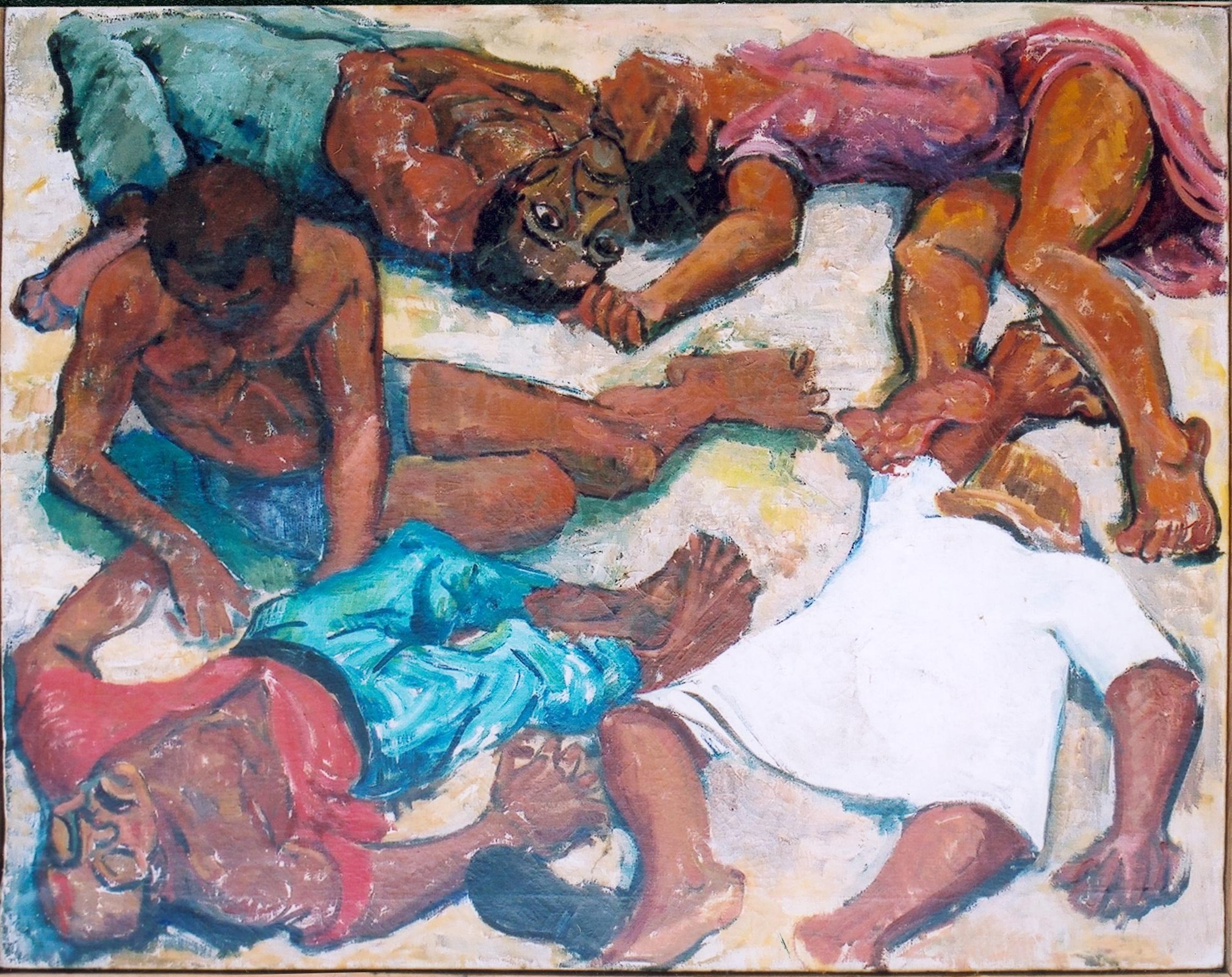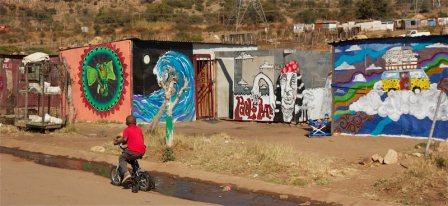|
Kate Serokolo
Kate Serokolo was a South African anti-apartheid activist. Biography Serokolo was from Mamelodi. She worked as a sales assistant and was married to Fritz Serokolo. In 1979 Serokolo, her mother and her aunt Elizabeth Komikie Gumede were accused of harbouring terrorists in their family home. She was aged 28 and pregnant with her second child at the time of her trial. She was sentenced to five years' imprisonment under the Terrorism Act. During her incarceration, Serokolo gave birth to her son Kabelo at the Kalafong Hospital in Atteridgeville, Gauteng, surrounded by soldiers who refused to leave the maternity ward. She later refused to follow prison rules, went on hunger strike and disrupted religious gatherings. In 1982, Serokolo, her aunt Gumede and fellow imprisoned anti-apartheid activists Caesarina Kona Makhoere, Thandi Modise and Elizabeth Nhlapo, made an application to the Minister of Justice, Kobie Coetsee Hendrik Jacobus Coetsee (19 April 1931 – 29 July 2000), ... [...More Info...] [...Related Items...] OR: [Wikipedia] [Google] [Baidu] |
Internal Resistance To Apartheid
Several independent sectors of South African society opposed apartheid through various means, including social movements, passive resistance, and guerrilla warfare. Mass action against the ruling National Party (South Africa), National Party (NP) government, coupled with South Africa's growing international isolation and economic sanctions, were instrumental in leading to Negotiations to end apartheid in South Africa, negotiations to end apartheid, which began formally in 1990 and ended with South Africa's 1994 South African general election, first multiracial elections under a universal franchise in 1994. Apartheid was adopted as a formal South African government policy by the NP following their victory in the 1948 South African general election, 1948 general election. From the early 1950s, the African National Congress (ANC) initiated its Defiance Campaign of passive resistance. Subsequent civil disobedience protests targeted curfews, pass laws, and "petty apartheid" segregati ... [...More Info...] [...Related Items...] OR: [Wikipedia] [Google] [Baidu] |
Kobie Coetsee
Hendrik Jacobus Coetsee (19 April 1931 – 29 July 2000), known as Kobie Coetsee, was a South African lawyer, National Party politician and administrator as well as a negotiator during the country's transition to universal democracy. Biography Born on 19 April 1931 in Ladybrand, Orange Free State, Union of South Africa a small agricultural town in the province of Orange Free State (now the province of Free State), he studied law at the University of the Orange Free State and qualified as an attorney. In 1968, Coetsee won the Bloemfontein West seat in the House of Assembly, vacated by J. J. Fouche, who became State President. P. W. Botha appointed him in 1978 as Deputy Minister for Defence and National Intelligence and, in 1980, to the powerful position of Justice Minister. The portfolio of Prisons was added to his responsibilities. On 12 October 1978, Coetsee became Deputy Minister of Defence and National Security. He reorganised National Intelligence after the Informa ... [...More Info...] [...Related Items...] OR: [Wikipedia] [Google] [Baidu] |
South African Anti-apartheid Activists
South is one of the cardinal directions or compass points. The direction is the opposite of north and is perpendicular to both west and east. Etymology The word ''south'' comes from Old English ''sūþ'', from earlier Proto-Germanic ''*sunþaz'' ("south"), possibly related to the same Proto-Indo-European root that the word ''sun'' derived from. Some languages describe south in the same way, from the fact that it is the direction of the sun at noon (in the Northern Hemisphere), like Latin meridies 'noon, south' (from medius 'middle' + dies 'day', ), while others describe south as the right-hand side of the rising sun, like Biblical Hebrew תֵּימָן teiman 'south' from יָמִין yamin 'right', Aramaic תַּימנַא taymna from יָמִין yamin 'right' and Syriac ܬܰܝܡܢܳܐ taymna from ܝܰܡܝܺܢܳܐ yamina (hence the name of Yemen, the land to the south/right of the Levant). South is sometimes abbreviated as S. Navigation By convention, the ''bottom or down-f ... [...More Info...] [...Related Items...] OR: [Wikipedia] [Google] [Baidu] |
Date Of Death Missing
Date or dates may refer to: * Date, the fruit of the date palm (''Phoenix dactylifera'') * Jujube, also known as red date or Chinese date, the fruit of ''Ziziphus jujuba'' Social activity *Dating, a form of courtship involving social activity, with the aim of assessing a potential partner **Group dating ** First date ** Blind date * Play date, an appointment for children to get together for a few hours *Meeting, when two or more people come together Chronology *Calendar date, a day on a calendar * Date (metadata), a representation term to specify a calendar date **DATE command, a system time command for displaying the current date *Chronological dating, attributing to an object or event a date in the past **Radiometric dating, dating materials such as rocks in which trace radioactive impurities were incorporated when they were formed Arts, entertainment and media Music * Date (band), a Swedish dansband * "Date" (song), a 2009 song from ''Mr. Houston'' *Date Records, a ... [...More Info...] [...Related Items...] OR: [Wikipedia] [Google] [Baidu] |
Shirley Gunn
Shirley Gunn (born 9 May 1955) is a South African former anti-apartheid activist and Umkhonto we Sizwe (MK) member who was falsely accused of the Khotso House bombings in 1998.Shirley Gunn ''South African History Online''. Accessed 16 May 2013. Early life and political activism Gunn was born the youngest of five children in the suburb of Kenilworth. Her father was a doctor and her mother a nurse. She attended a convent school from age 5 to 18. In 1966 and 1967, Gunn accompanied her mother to various poor communities in Cape Town. From age 17, Gunn assisted her brother who was a doctor at a clinic in Hermanus. Disillusioned by apartheid, she left nursing in 1976 and enrolled at the[...More Info...] [...Related Items...] OR: [Wikipedia] [Google] [Baidu] |
Zubeida Jaffer
Zubeida Begum Dhanrajgir (1911 – 21 September 1988) was an Indian actress. Early in her career, she starred in a number of silent films, which were followed by a breakthrough in the first Indian talkie ''Alam Ara'' (1931). Her other notable works include Sagar Movietone's ''Meri Jaan'' (1931) and ''Devdas'' (1937). Early life Born in 1911 in Surat city of Gujarat in western India, Zubeida was the daughter of Nawab Sidi Ibrahim Muhammad Yakut Khan III of Sachin State and Fatma Begum. She had two sisters, Sultana and Shehzadi, both actresses. She was among the few girls who entered films as a teenager during a time when it was not considered a honourable profession for girls from respectable families. Nazir, Asjad. "Lighting Up the Big Screen."''Eastern Eye'', 26 July 2013, pp. 21-33. Career Zubeida was only 12 when she made her debut in ''Kohinoor'', which was a talkie at the time. Through the 1920s she made infrequent appearances on screen along with Sultana who, by then ... [...More Info...] [...Related Items...] OR: [Wikipedia] [Google] [Baidu] |
South African Truth Commission
The Truth and Reconciliation Commission (TRC) was a court-like restorative justice body assembled in South Africa in 1996 after the end of apartheid. Authorised by Nelson Mandela and chaired by Desmond Tutu, the commission invited witnesses who were identified as victims of gross human rights violations to give statements about their experiences, and selected some for public hearings. Perpetrators of violence could also give testimony and request amnesty from both civil and criminal prosecution. The Institute for Justice and Reconciliation was established in 2000 as the successor organisation of the TRC. Creation and mandate The TRC was set up in terms of the ''Promotion of National Unity and Reconciliation Act'', No. 34 of 1995, and was based in Cape Town. The hearings started in 1996. The mandate of the commission was to bear witness to, record, and in some cases grant amnesty to the perpetrators of crimes relating to human rights violations, as well as offering reparatio ... [...More Info...] [...Related Items...] OR: [Wikipedia] [Google] [Baidu] |
Elizabeth Nhlapo
Elizabeth or Elisabeth may refer to: People * Elizabeth (given name), a female given name (including people with that name) * Empress Elisabeth (other), lists various empresses named ''Elisabeth'' or ''Elizabeth'' * Princess Elizabeth (other), lists various princesses named ''Elizabeth'' * Queen Elizabeth (other), lists various queens named ''Elizabeth'' * Saint Elizabeth (other), lists various saints named ''Elizabeth'' or ''Elisabeth'' ** Elizabeth (biblical figure), mother of John the Baptist Film and television * ''Elizabeth R'', 1971 * ''Elizabeth'' (TV series), 1980 * ''Elizabeth'' (film), 1998 * '' Elizabeth: The Golden Age'', 2007 Music * ''Elisabeth'' (Elisabeth Andreassen album) * ''Elisabeth'' (Zach Bryan album) * Elizabeth (band), an American psychedelic rock/progressive rock band active from 1967 to 1970 * ''Elizabeth'' (Lisa album) * ''Elizabeth'', an album by Killah Priest * "Elizabeth" (Ghost song) * "Elizabeth" (The S ... [...More Info...] [...Related Items...] OR: [Wikipedia] [Google] [Baidu] |
Mamelodi
Mamelodi is a township northeast of Pretoria, Gauteng, South Africa. A part of the City of Tshwane Metropolitan Municipality, it was set up by the then apartheid government in 1953. Etymology"Mamelodi" is the name derived from the Sepedi word with the prefix being "ma" meaning mother, and the suffix "melodi" meaning melodies. Its meaning can be translated to mean ''Mother of Melodies''. History The township was established when 16 houses were built on the farm Vlakfontein in June 1953 and later the name changed to Mamelodi. The Group Areas Act designated Mamelodi as a blacks-only area, though this became moot with the fall of |
Thandi Modise
Thandi Ruth Modise (born 25 December 1959) is a South African politician who served as the Minister of Defence and Military Veterans from 2021 to 2024. She was previously the Premier of the North West from 2010 to 2014, Chairperson of the National Council of Provinces from 2014 to 2019, and Speaker of the National Assembly from 2019 to 2021. Modise has been a member of the African National Congress (ANC) since the 1976 Soweto uprising, when she dropped out of high school to join uMkhonto we Sizwe (MK), the ANC's armed wing, in exile. In 1978 she returned to South Africa as a trained guerrilla operative for MK and from 1980 to 1988 she was imprisoned under the Terrorism Act for her anti-apartheid activism. She was elected to the South African Parliament in South Africa's first democratic election in 1994. After ten years in the National Assembly, she served as the Speaker of the North West Provincial Legislature from 2004 to 2009 before becoming Premier in 2010. She next ... [...More Info...] [...Related Items...] OR: [Wikipedia] [Google] [Baidu] |
Caesarina Kona Makhoere
Caesarina Kona Makhoere (born 1955) is a former South African anti-apartheid activist and prison writer. Biography Makhoere was born near Pretoria in 1955 and attended Vlakfontein Technical High School. Alongside her family, she was forcibly removed under the terms of the Group Areas Act and relocated to Mamelodi as a child. Makoere became associated with the resistance organisation Black Sash. She was arrested in October 1976 under the Terrorism Act and spent ten months in the Silverton Police Station, Mamelodi, Gauteng, awaiting trial. In 1977, she was convicted for attempting to undergo military training in order to resist legislation that school classes throughout South Africa were to be taught in Afrikaans. In 1982, alongside fellow imprisoned anti-apartheid activists Elizabeth Komikie Gumede, Thandi Modise, Elizabeth Nhlapo and Kate Serokolo, Makhoere made an application to the Minister of Justice, Kobie Coetsee, hoping to have their isolation declared illegal and to ... [...More Info...] [...Related Items...] OR: [Wikipedia] [Google] [Baidu] |


